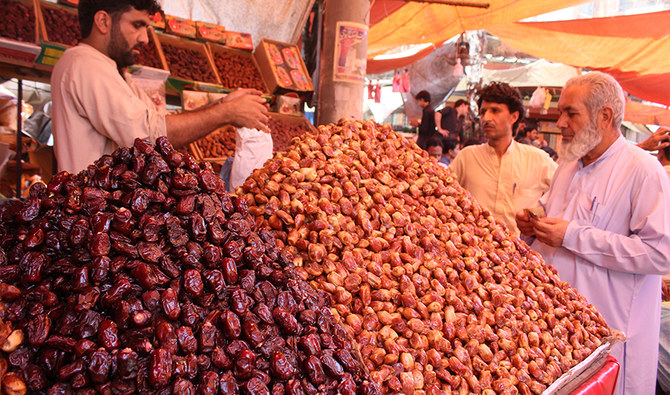KARACHI: Remaining almost lackluster for most of the months, Pakistan’s oldest market for kHajjoor (dates) springs into life ahead of Ramadan, even as most buyers said that the increased prices of the fruit, due to a devalued rupee, were making the experience less sweet.
Located in Karachi’s Lyari area, the KHajjoor market – which was established prior to the formation of Pakistan in 1947 – caters to the supply of datesand other related products for the entire country, especially during Ramadan when demand for the commodity jumps to more than 100 percent. The fruit is a quintessential part of the iftar (end of the fast) meal and is the first thing which is eaten after a Muslim ends his/her fast for the day. The dates serve as a good source of energy and provide essential vitamins.
“Several people, including wholesalers and retailers, rush to buy the commodity before Ramadan. The trading increases by more than 100 percent,” Muhammad Sabir, president of the KHajjoor Merchants’ Association, told Arab News.
“This year, the trading activity has also picked up in the traditional manner, but the prices of dates have increased manifold,” Hanif Baloch, General Secretary of the market association said, adding that the “price spiral is because of the devaluation of the Pakistani currency”.
Pakistan meets around 50 percent of its peak demand of dates through imports which are mostly from Iran, Iraq, Saudi Arabia, and other gulf countries.
Pakistan has devalued its currency by 34 percent to PKR 141 against the US dollar since December 2017 mainly for boosting exports and curtailing imports.
“Due to devaluation (Pak Rupee), the prices of imported dates have increased from PKR 6000-7000 per maund of last year to PKR 12000-13000 per maund. Besides, less crop of dates this year in Iran also played role in price hike,” Sabir said.
Buyers, for their part, complained about the “very expensive dates” this year. “They are selling kHajjoor very expensive. The variety which was sold at PKR 80 per kilogram last year is now gone up to PKR 180 per kg,” Abdul Hameed, a daily wager, said while scouring the market for cheaper options.
“Rates are much higher this year. Even they are selling low quality dates for PKR 150 per kg,” Abdullah, who has retired from work, said.
As the business gains momentum, the number of vendors in the area – who set up makeshift shops and kiosks, some of which run into hundreds – have also multiplied.
“Though big shop owners draw major chunk of business but small vendors’ sales also sees major jump. A small vendor who sells from PKR 10,000 worth of dates in other months earns around PKR 100,000 in Ramadan,” Khizar, one of the vendors, said.
Shopkeepers said the demand is for the imported varieties of dates, such as Zahidi, Muzafati and Rabai while locally, the Aseel variety – which is mostly produced in Sukkar, Sindh – is the most sought after in Ramadan.




















